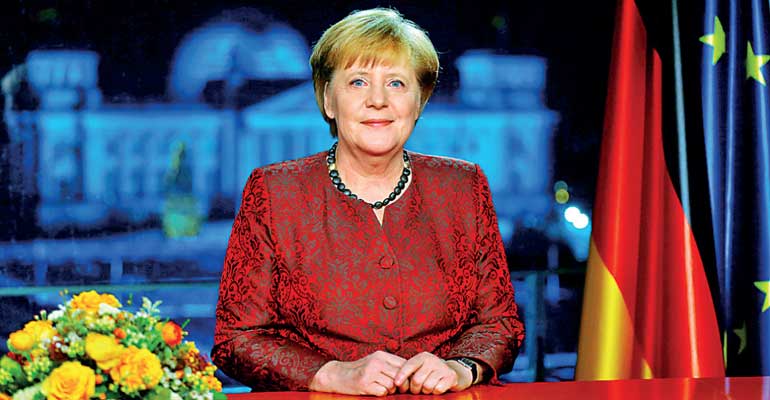Sunday Feb 22, 2026
Sunday Feb 22, 2026
Monday, 1 January 2018 00:00 - - {{hitsCtrl.values.hits}}
BERLIN (Reuters): Conservative Chancellor Angela Merkel, under pressure after three months of failing to form a new ruling coalition, on Sunday vowed to address growing social divisions as she worked rapidly to build a stable German government.

German acting Chancellor Angela Merkel poses for photographs after the television recording of her annual New Year’s speech at the Chancellery in Berlin, Germany, December 30, 2017. REUTERS
Merkel mapped out key priorities in her annual New Year’s address, including increased investments in security and defence, improved health care and education, and efforts to overcome growing urban-rural disparities.
“The world is not waiting for us. We must create the conditions now that ensure that Germany continues to prosper in 10, 15 years,” the conservative leader said. “And Germany will only prosper if its success serves all people and improves and enriches our lives.”
Merkel, seeking a fourth term in office, is trying to persuade the centre-left Social Democrats (SPD) to extend the “grand coalition” that ruled for the past four years despite big losses suffered by both political blocs in the Sept. 24 polls.
The alternative would be a minority government or new elections that could hand further gains to the far-right Alternative for Germany (AfD) party, which entered parliament for the first time amid concerns about Merkel’s decision in 2015 to welcome over a million mainly Muslim migrants to Germany.
Merkel’s popularity has waned since her efforts to form a three-way coalition with two smaller parties collapsed in November, and a new poll released Saturday showed that nearly two-thirds of all Germans want her to resign if upcoming coalition talks with the SPD also fail.
She said more Germans were concerned about social cohesion than ever before, with some lauding Germany’s diverse and open society, while others feared growing crime and violence, complained about a lack of doctors in rural areas, and worried about how to manage the influx of migrants.
“Both are realities in our country: the success and the optimism, but also the fears and the doubts. For me, both are impetus,” she said.
Merkel said politicians needed to address future challenges as well as the needs of all citizens, such as good jobs, improved digital access and reduced burdens for families.
“I feel obligated by that directive – also, and especially as part of the work to build a new stable government for Germany in the new year,” she said.
Merkel said the decisive issue in coming years would be to strengthen the European Union and its economic success while also bolstering its external boundaries and security.
She said she hoped the new year helped strengthen the ties that united Germans, including respect for each other and the inviolable dignity of all people – a core tenet of the German constitution framed after the end of World War Two.